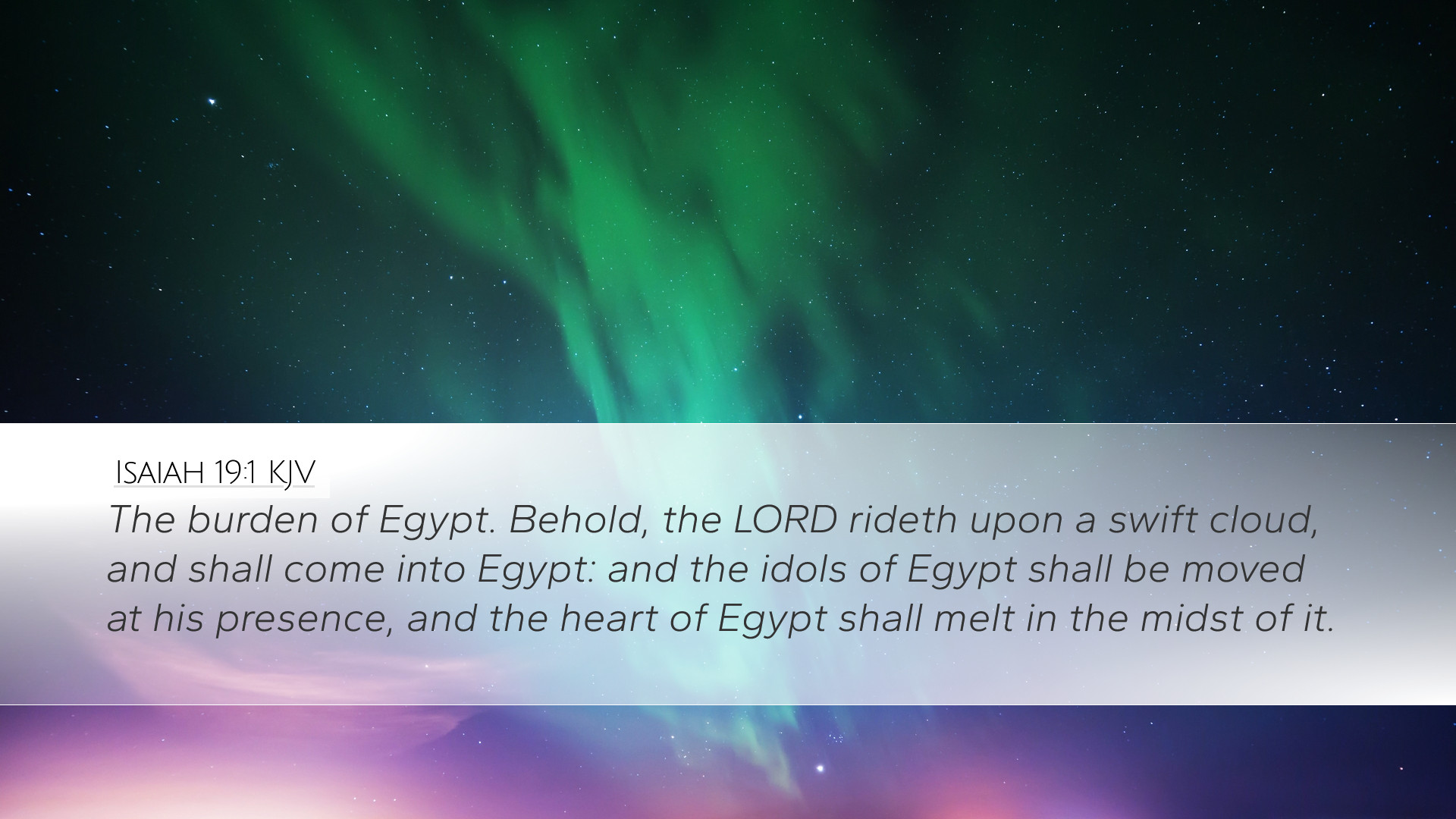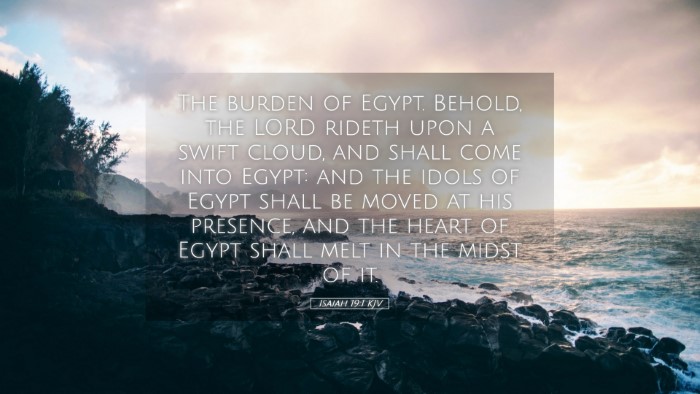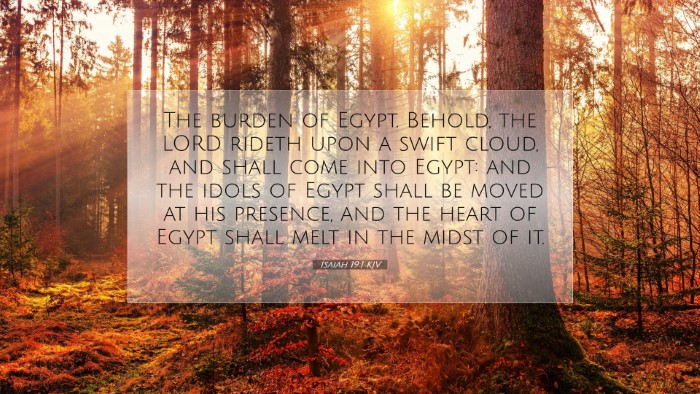Isaiah 19:1 Commentary
Verse: "The burden of Egypt. Behold, the Lord rideth upon a swift cloud, and shall come into Egypt: and the idols of Egypt shall be moved at his presence, and the heart of Egypt shall melt in the midst of it."
Introduction
Isaiah 19:1 serves as a prelude to God's impending judgment upon Egypt, articulated through the prophet Isaiah. This verse not only sets the tone for the subsequent verses addressing Egypt's sorrows but also offers profound theological insights regarding divine authority and the futility of idolatry.
Exegesis
This verse comprises several components that warrant deeper examination:
The Burden of Egypt
The phrase "the burden of Egypt" suggests a prophetic oracle laden with judgment. According to Albert Barnes, a burden implies a weighty message, reflecting the serious nature of the impending calamity directed at Egypt due to its idolatry and oppression of Israel. Matthew Henry also notes that the burdens are often employed in the prophetic literature to denote messages foretelling misfortunes.
The Lord Rides Upon a Swift Cloud
The imagery of the Lord riding upon a swift cloud signifies both His majesty and the rapidity of His approach. Adam Clarke emphasizes that this metaphor conveys God's sovereign control over nature, underscoring His power to execute judgment swiftly. The cloud symbolizes God's glory and presence, reminiscent of the theophany depicted in Exodus where God led the Israelites in a pillar of cloud.
Coming into Egypt
This action of God coming into Egypt implies an active involvement in the affairs of nations. The theological significance here, as Matthew Henry elaborates, is that God is not distant but rather engages directly with human history to bring about His purposes. This continued engagement highlights God’s omnipotence and His desire to maintain justice among nations.
The Idols of Egypt
One of the most critical assertions in this verse is the mention of the idols of Egypt being moved at God's presence. According to Albert Barnes, this reflects the impotence of Egyptian gods in the face of the true God. The idols, which represent false hope and assurance for the Egyptians, will be destabilized, showcasing God's supremacy over false deities. The heart of Egypt melting signifies profound fear and trepidation in the face of impending divine judgment.
Heart of Egypt Shall Melt
The phrase "the heart of Egypt shall melt in the midst of it" illustrates a powerful psychological and emotional response to the revelation of God’s holiness and judgment. Adam Clarke explains that this metaphor indicates despair and fear that will overtake the Egyptians as they realize the futility of their reliance on idols and the imminent threat of divine judgment. Such imagery serves as a stark reminder of the consequences of turning away from God.
Theological Insights
The Sufficiency of God's Sovereignty
This verse encapsulates a central tenet of biblical theology—the sovereignty of God. His rulership extends over all nations, and His judgment will ultimately fall upon those who oppose Him. This universality of God's reign reinforces both His holiness and justice, which should compel believers to recognize their moral responsibility before a holy God.
The Futility of Idolatry
The commentary on Egypt's idols is a stark indictment against idolatry, a theme prevalent throughout the Scripture. As emphasized by Matthew Henry, idols—entities believed to provide security or prosperity—are deemed powerless in the face of true divine authority. Practitioners of religion today ought to examine their lives for any modern-day idols, recognizing that any object of misplaced trust will ultimately fail.
Application for Pastors and Theologians
Confrontation with Evil
For pastors, Isaiah 19:1 serves as both a warning and encouragement to confront the idols in contemporary society—whether they manifest as materialism, power, or even cultural ideologies. The swift arrival of God's judgment teaches that God is not merely a passive observer but actively addresses issues of injustice and idolatry.
Understanding Divine Judgment
Theological reflection on this verse provides insight into the nature of divine judgment. It is essential for students and scholars to grapple with the concept that judgments are not arbitrary but arise from God's inherent justice. The understanding that God confronts nations regarding their sins should inspire a sense of urgency in evangelistic efforts and a deepened commitment to teaching holiness within congregations.
Conclusion
Isaiah 19:1 is a microcosm of the larger themes present in the book of Isaiah—the holiness of God, the inevitability of divine judgment, and the futility of false worship. This commentary, synthesizing insights from Matthew Henry, Albert Barnes, and Adam Clarke, invites pastors, students, and theologians to engage deeply with this text, reflecting on the implications for both personal faith and broader societal concerns.


